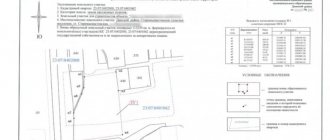Features of donating non-residential premises
The same donation rules established by Chapter 1 apply to residential and non-residential premises. 32 of the Civil Code of the Russian Federation. According to Art. 574 of the Civil Code of the Russian Federation, the donation of any real estate is made in writing, where the owner is the donor, and the recipient of the gift is the donee.
What features are important to consider:
- You can donate any premises owned by the donor. If he rents it, the deal is invalid.
- The organization to which the premises belong by right of economic management has the right to donate the building with the written consent of the actual owner.
- If the donated property is jointly owned, the consent of the remaining owners will be required.
- To donate real estate in shared ownership, the permission of other owners is not required.
- Giving a gift worth RUB 3,000 or more. from a legal entity is drawn up in writing. If necessary, you will have to take the consent of the remaining participants, if this is provided for in the constituent documents.
- If the premises have defects that pose a threat to life and health, the donee must be notified about them, otherwise he will be able to recover compensation on the basis of Art. 580 Civil Code of the Russian Federation.
- You cannot make gifts worth more than 3,000 rubles. employees of banks, state and municipal bodies, social and educational institutions, if the transaction is related to the performance of their official duties.
Important! The gift agreement (hereinafter referred to as the DD) is drawn up in the presence of both parties. If the donee or donor cannot sign it personally, legal representatives by power of attorney have the right to act on their behalf.
Complete the survey and a lawyer will share a plan of action for a gift agreement in your case for free.
Possible risks for the parties
Execution of a donation agreement for non-residential premises General requirements for the form of a donation agreement are determined by the provisions of Art. 574 of the Civil Code, according to which non-residential real estate can be transferred to new owners, both under oral and written agreements.
Donation of non-residential premises to a relative taxation
- employees of social, educational and medical organizations do not have the right to act as recipients;
- employees of state and municipal bodies are prohibited from accepting such gifts;
- minors, as well as incapacitated persons, cannot act as donors;
- a transaction for the donation of non-residential premises is prohibited between commercial organizations.
The concept of “sole housing” implies the absence of additional square meters. That is, the person who is the seller under the purchase and sale agreement should not own other real estate.
In 2021, legislative changes will come into force that will affect almost all real estate owners. Income received from real estate transactions is taxed. That is why many citizens became interested in the question of the possibility of avoiding unnecessary spending. Next, we’ll talk about the types of taxation associated with real estate transactions, as well as the features of their calculation in 2021.
You may like => Benefits of traveling by train for pensioners in St. Petersburg
Types of real estate taxes
The person who received the property as a gift is required to pay personal income tax. This obligation is ensured by amendments to the Tax Code, which come into force in January 2021. In this case, the cadastral value of the object, which was in force at the time of registration of ownership, is taken as the tax base.
- passports of the donor and recipient;
- documents for the transferred property, confirming the legality of its acquisition by the donor;
- certificate of state registration of real estate rights;
- technical passport of the object;
- power of attorney, if one of the participants acts not independently, but through a representative;
- permission of the spouse, if the donor acquired the property during the marriage, and it is considered jointly acquired property;
- permission from the guardianship authorities in some cases (if a minor is involved in the transaction).
What kind of non-residential premises can be donated?
Non-residential includes all buildings or premises that are not intended for human habitation and have a specific purpose:
- garages;
- non-residential premises in apartment buildings (usually on the first floors);
- offices, warehouses;
- industrial premises;
- the shops;
- detached buildings;
- non-residential properties owned by the municipality.
The main condition is the recognition of the premises as non-residential and the availability of relevant documents where this will be indicated.
It is important to consider that individual buildings are donated along with the land plots on which they are located. Not only premises are donated, but also shares in ownership, or allocated shares in kind.
How to correctly draw up a deed of gift for a land plot?
How to properly draw up a real estate donation agreement and what is needed for this?
Registration of a donation agreement for non-residential premises in Rosreestr
According to Art. 2 Federal Law No. 302 dated December 30, 2012, state registration of real estate donation agreements was cancelled. However, this does not at all relieve the parties from the obligation to carry out state registration of rights to real estate (Article 131 of the Civil Code), carried out on the basis of Federal Law No. 122 of July 21, 1997, taking into account specialized Methodological recommendations.
Attention
According to paragraph 2 of Art. 223 of the Civil Code, the right of ownership in transactions requiring state registration of rights passes to the purchasers of goods (the donee) only after it has been completed .
According to Art. 9 Federal Law No. 122, state registration is carried out by the Federal Service for State Registration of Cadastre and Cartography (Rosreestr), local branches of the service in populated areas and Multifunctional Centers (MFC). To register rights to non-residential premises, applicants submit to the specified authorities a set of documents, the requirements for which are indicated in Art. 18 F No. 122.
The required documents themselves are defined in the articles of the said law, but it is advisable to find out their specific list in advance from the state registrar. It should also be remembered that before submitting documents, applicants must pay a state fee , the amount of which, according to Art. 333.33 Tax Code is 2 thousand rubles. for citizens and 22 thousand rubles. for legal entities persons
In the registration procedure, these bodies check the submitted documents for their compliance with the law , enter information into the register of rights (USRE), apply certification inscriptions to the title documents and return them, along with the state registration certificate, to the applicants.
According to Art. 13 Federal Law No. 122, registration is carried out within 10 working days from the date of submission of documents. After this period, in the absence of contradictions to the law, the applicants are issued the specified documents, and the donee should be considered the rightful owner of the non-residential premises.
Example
PlitSpichTorg LLC and TsRMO OJSC entered into a donation agreement, according to which TsRMO received private ownership of warehouse premises with an area of 800 square meters. m. After signing the deal, representatives of the parties sent documents for state registration of rights. After 10 working days, a representative of OJSC “TsRMO” received by mail a resolution refusing state registration due to non-compliance with the requirements of the law in the content of the submitted documents (Article 20 of Federal Law No. 122). In particular, the applicants were explained that donations between commercial organizations, of which they were, were prohibited (clause 4 of Article 575 of the Civil Code).
Who can you donate non-residential premises to?
Typically, the DD of non-residential premises is concluded between individuals, but other variations are possible:
- from an individual to a legal entity;
- from a legal entity to an individual;
- between citizens who are close relatives;
- gift to a minor.
In the latter case, it is important to take into account that a child over 14 years of age participates in the transaction independently, but with the consent of the parents. Parents sign for children under 14 years of age.
Let's consider an example of a gift between individuals:
A man (individual entrepreneur) owns a store located in a separate building. He decides to give it to his daughter so that she can continue to do business as an individual entrepreneur.
The parties agree on the terms of the transaction and sign the agreement by contacting a notary. After concluding the DD, they apply to Rosreestr for registration, and the donor’s daughter becomes the owner of the building and the store.
Important! If the donor, along with non-residential premises, wants to donate the property located in it, this should be reflected in the contract. Otherwise, it will only apply to real estate.
Gift from an individual to a legal entity
An individual means any citizen or individual entrepreneur, while only commercial or non-profit organizations are recognized as legal entities.
A citizen has the right to donate a non-residential building or premises to an enterprise under a gift agreement.
If both parties to the transaction are engaged in commercial activities, donation is prohibited.
Legal advice: if a person wants to make a gift for the general benefit of a non-profit organization, it is better to draw up a donation agreement (Article 582 of the Civil Code of the Russian Federation). This will allow you to control the use of the property for its intended purpose, and if necessary, it will be easier to challenge the transaction.
Elena Plokhuta
Lawyer, website author (Civil law, 7 years of experience)
Donation of non-residential premises between legal entities
This option is also possible if one or both parties are engaged in non-profit activities. Property that belongs to the organization and is on its balance sheet is donated.
The deed of gift is signed by the founder or other authorized person, after which accounting documents are drawn up and the gift is deregistered. On the contrary, the donee must draw up all the documents himself.
Are you tired of reading? We’ll tell you over the phone and answer your questions.
Is a gift taxable?
The rules for calculating tax and paying it apply only to Russian citizens. If the recipient is a citizen of another country, he will be required to pay 30% of the cost of the apartment. There are also special rules when donating an apartment to a child:
Tax deduction for the purchase of an apartment
The tax rate is specified in Art. 224 Tax Code of the Russian Federation. For resident individuals - 13% , for non-residents - 30% . The calculation scheme is established by Art. 225 Tax Code of the Russian Federation. To calculate personal income tax, you need to multiply the tax base by the applicable rate.
The law allows strictly defined categories of persons closely related to the donor not to pay income tax.
Since it is practically impossible to transfer an apartment tax-free to a non-relative (only in relation to consular employees and their families), according to the general rule, the gifted object is subject to income tax, which means that the recipient must pay 13%. The rate is applied to the value of the property received and amounts to an impressive amount if Russian citizens accept expensive housing as a gift. For non-residents the rate is even higher – 30%.
Is gifting of real estate taxable?
High tax costs for donating an apartment to a relative who does not have a close family connection with the donor often force them to choose the option of purchase and sale, assuming the transaction is paid. If the property is transferred to a relative, it is possible to draw up a will, but he will be able to take ownership only six months after the death of the owner. A deed of gift gives the right to re-register during a person’s lifetime, without requiring special preparation for the transaction and large associated expenses.
A man (individual entrepreneur) owns a store located in a separate building. He decides to give it to his daughter so that she can continue to do business as an individual entrepreneur.
Donation of non-residential premises with an encumbrance in the form of rent
After the donation, the right of ownership passes to the donee, but it is not necessary to terminate or renew the lease agreement with tenants of non-residential commercial premises (Article 617 of the Civil Code of the Russian Federation). But the deed of gift must indicate that the property is leased from another company or person.
After signing the DD, you need to notify the tenant about the change of parties. After re-registration of real estate, it is the new owner who receives the rights and obligations of the previous lessor (donor).
Important! You do not need to take permission from the tenant to donate the premises to another person or organization.
How to draw up a donation agreement for commercial real estate: procedure
Conventionally, the execution of a gift agreement consists of the following stages:
- Preparation of documents, drawing up a deed of gift independently or with the assistance of a lawyer. A notary who will certify the transaction can also help you draw up the agreement correctly.
- Signing the contract, notarization.
- Registration of transfer of ownership in Rosreestr or any branch of the MFC.
Sample deed of gift
The donation agreement must include the following information:
- Full name, passport details of the donor and recipient. If these are legal entities, then the data is from the constituent documentation.
- Date and place of conclusion of the deed of gift.
- The date on which the agreement comes into force. If the date is not specified, then by default the terms of the donation come into force from the moment of signing.
- Description of the object of donation: what real estate is being donated, where it is located, its technical characteristics and cadastral number. It is necessary to indicate on what basis the donor owns the property and the estimated value of the property.
- An indication that the property is being donated free of charge.
- Signatures of the donor and recipient, notarization.
The gift agreement is drawn up in three copies: one for each of the parties and one remains for storage in Rosreestr.
Documents required for the transaction
The following documents will be required for the transaction:
- Passports of the parties.
- Title documents for real estate.
- Deed of gift in triplicate.
- Receipt for payment of state duty.
To register the transfer of ownership in Rosreestr you will need the following package of documents:
- Donation agreements certified by a notary.
- Passports of the parties.
- Title documents for real estate.
- Receipt for payment of state duty.
An individual will pay 2,000 rubles for registering the transfer of ownership, and a legal entity will pay 22,000 rubles.
The procedure for drawing up a contract of donation of non-residential premises
The procedure for concluding a DD for a non-residential premises or building consists of several stages:
- Drawing up a deed of gift. The conditions are agreed upon by the donor and the recipient. The contract is drawn up independently or with the participation of a lawyer.
- Signing the contract. In most cases, notarization is not required, but if a notary's signature is required, the parties sign in his presence.
- Submitting documents to the registrar. The contract itself is not registered, but ownership is re-registered. You should contact Rosreestr or the MFC; the attendance of both parties is required.
Finally, the new owner receives an extract from the Unified State Register. Registration actions are allotted 10 calendar days.
Legal advice: it is better to ask a notary for certification, even when his signature is not required. This will protect the transaction from challenges and claims from third parties.
Elena Plokhuta
Lawyer, website author (Civil law, 7 years of experience)
Contents and sample agreement for the donation of non-residential premises
There is no unified form for deed of gift, but it is necessary to submit an agreement to Rosreestr containing complete and reliable information about the transaction:
- Full name, registration addresses, dates of birth, passport details of the parties;
- date of conclusion;
- start date of execution of the DD: after signing or on a specific day (if a contract of promise of donation in the future is drawn up);
- information about the premises: address, area, number of rooms, cadastral number, date of ownership of the donor;
- the intention of the donor to transfer property to the donee free of charge;
- conditions for changing or terminating the transaction.
At the end, the parties sign. The DD is drawn up in three copies: one remains with the citizens, the third is transferred to the registrar for making changes to the Unified State Register.
Sample contract for donation of non-residential premises:
Consultation on document preparation
Documentation
To draw up a deed of gift, you will need the passports of the parties, a certificate of ownership or an extract from the Unified State Register of Real Estate for real estate, and a document on the basis of which the donor owns the real estate.
Notarial consent of the remaining owners is also provided if the property is jointly owned (bought during marriage).
You do not need to provide a receipt for payment of the state duty, but it may be required if the registrar does not see the receipt of money. It's better to take it with you. The state fee for re-registration of property rights is paid by the donee.
State duty
The state duty for citizens is 2,000 rubles, for commercial and non-profit enterprises – 22,000 rubles.
Donation of non-residential premises between legal entities
- Drawing up a deed of gift. The conditions are agreed upon by the donor and the recipient. The contract is drawn up independently or with the participation of a lawyer.
- Signing the contract. In most cases, notarization is not required, but if a notary's signature is required, the parties sign in his presence.
- Submitting documents to the registrar. The contract itself is not registered, but ownership is re-registered. You should contact Rosreestr or the MFC; the attendance of both parties is required.
You may like => Children's benefits for Kabardino Balkaria single mother
Documentation
You do not need to provide a receipt for payment of the state duty, but it may be required if the registrar does not see the receipt of money. It's better to take it with you. The state fee for re-registration of property rights is paid by the donee.
If there is a need to sell the property before the minimum period of use has expired, the owner will have to pay tax. However, in this situation, the state stands on the side of the citizen. At the legislative level, tax incentives are provided that significantly reduce the tax on the sale of an apartment or house.
From January 1, 2021, the authorities want to introduce a progressive tax scale: the personal income tax rate will be 15% instead of the standard 13% for Russians who earn more than 5 million rubles a year. This amount will also include proceeds from the sale of real estate.
How will taxation change for real estate transactions?
In accordance with the laws of the Russian Federation, any income received by an individual must be taxed. Thus, a person who sells an apartment, house or other piece of real estate receives income. This means that it must pay tax on the sale of real estate.
The obligation to pay personal income tax arises for individuals only if the property is put up for sale in 2021 and before the expiration of five years from the date of registration of the citizen as the owner. Moreover, if the property is the owner’s only home, he is exempt from paying tax after three years of owning the property.
What taxes will you have to pay?
When receiving property as a gift, you must pay personal income tax in the amount of 13% of the cadastral value. But this rule does not apply to close relatives of donors who received gifts - they do not pay taxes (Article 217 of the Tax Code of the Russian Federation).
Such relatives include:
- spouses;
- parents;
- full or half brothers, sisters;
- children.
Before payment to the Federal Tax Service, a 3-NDFL declaration is submitted by April 30. After reconciliation, personal income tax is paid by July 15. Payers calculate taxes themselves. Donors do not pay anything, because... do not make a profit from the transaction.
Parties to the transaction
Let us immediately note that, according to the legislation in force in 2021, the registrar has 10 calendar days to register donated real estate, starting from the moment the parties transfer the documents and receive the corresponding receipt of their acceptance. In the receipt itself, the authority’s employees indicate the date of receipt of the documentation, as well as the expiration date of the registration period (the date the recipient received an extract from the Unified State Register of Real Estate).
Positive and negative sides of the deal
Please note that the declaration must be submitted in any case - whether the value of the real estate is indicated in the gift agreement or not. In addition, along with the declaration, you need to create an accompanying package of documents. On its basis, it is established whether the tax is calculated correctly when donating real estate to a non-relative or a non-resident relative.
You may like => Is it possible to spend maternity capital on the purchase of land in 2021?
In accordance with tax legislation (paragraph 2, clause 18.1, article 217 of the Tax Code of the Russian Federation), such relatives are recognized as: spouses, parents and children (including adoptive parents and adopted children), grandparents and grandchildren, full and half-blooded (having a common father or mother) brothers and sisters. Any property, including real estate, received as a gift from these persons is not subject to tax.
The donor never pays tax
If the apartment was given to you by a non-relative, a stranger, a friend, a distant relative or a relative who is not close, then you were required to pay tax when donating the apartment. We will determine when you can sell a donated apartment without tax. So, if the apartment was donated after January 1, 2021 and you owned the real estate:
When accepting a gift from a relative, we rarely consider whether tax law considers the gift to be income and whether we must pay tax on it. After all, a gift from relatives is a gift within the family, when no one has lost and no one has gained. But is this so, and what does the Tax Code say about this?
Challenging a contract of donation of non-residential premises
The deed of gift is contested in court if there are grounds provided for in Art. 166-179, Art. 578 Civil Code of the Russian Federation:
- signing a contract under the influence of delusion, blackmail, violence;
- incapacity, limited legal capacity of the donor at the time of execution of the transaction;
- signing a deed of gift by a citizen who is not aware of the consequences of his actions;
- commission by the donee of a crime against the health and life of the donor. In case of death, the DD is disputed by the heirs;
- careless handling of donated premises in the presence of a risk of irretrievable loss, if the property is of non-property value to the previous owner.
The donor's creditors can also challenge the transaction if the property was purchased with funds from business activities, and the DD itself was drawn up within six months after the citizen or organization was declared bankrupt.
Nuances when transferring a gift between relatives
If non-residential real estate is donated to a close relative (this includes: siblings, parents, children, legally married spouses, grandparents, grandchildren), then the gift transaction will not be taxed. This is regulated by Art. 217 of the Tax Code of the Russian Federation, neither party should pay tax.
If the gift is intended for a distant relative (this includes: cousins and second cousins, nephews, great-uncles and grandmothers and other numerous relatives), then the one who receives the gift is required to pay a tax in the amount of 13% of the value of the non-residential property.
If the recipient is not a resident of the Russian Federation, then he is obliged to pay a tax in the amount of 30% of the value of the property.
Arbitrage practice
The donation is contested in court. Evidence will be required to support the validity of the claims. If they are not there, achieving what you want will be problematic.
But there are real decisions that show that the plaintiffs managed to challenge the deed of gift and return the property:
- Decision No. 2-2012/2019 2-2012/2019~M-1130/2019 M-1130/2019 dated July 25, 2021 in case No. 2-2012/2019;
- Decision No. 2-4339/2019 2-4339/2019~M-2735/2019 M-2735/2019 dated June 24, 2021 in case No. 2-4339/2019;
- Decision No. 2-126/2019 2-129/2019 2-3872/2018 dated June 14, 2021 in case No. 2-126/2019.
After the decisions entered into force, the property was returned to the donors, and ownership was re-registered in their name.
Features of donating commercial premises
In legislation, commercial real estate is listed as non-residential. So later in the article we will use both concepts, but in fact they are the same thing.
Non-residential premises and residential premises are subject to the same donation rules - according to Article 32 of the Civil Code of the Russian Federation. But, since the purpose of the premises is different, there are still several features of drawing up a gift agreement for commercial real estate:
- You can donate any premises, but only if it belongs to the donor, he is the owner. If he has an indefinite lease agreement, then he cannot donate this object.
- If the premises belong to a person under an economic management agreement, then she can donate it, but only if there is the actual consent of the owner.
- If a person owns part of the premises and wants to give this part to someone, then the consent of the other owners is not required. Unlike a purchase and sale transaction.
- If the value of the gift is more than 3,000 rubles, then the transaction must be formalized in writing and certified by a notary. And since real estate in any case will cost more than 3 thousand rubles, by default we say that notarization is required.
- If the premises have any serious technical problems that could pose a threat to the life and health of people located there or nearby, the donor is obliged to inform the recipient about this. If this is not done and some problem occurs due to the emergency condition of the building, the recipient has the right to demand compensation from the donor. This is described in detail in Article 580 of the Civil Code of the Russian Federation.
If the recipient is an employee of a bank, state or municipal department, social or educational institution, then such gifts cannot be given to him.

Lawyer's answers to frequently asked questions
Is it possible to donate non-residential commercial premises with utility debts?
Yes. By law, the debt belongs to the person who owned the property during the period of its accumulation.
Is it necessary to obtain the consent of the other owners when donating non-residential premises on the ground floor of an apartment building?
No. Consent is only required when opening establishments. A general meeting is held on the basis of Art. 48 Housing Code of the Russian Federation.
Do I need to have a deed of gift for non-residential premises certified by a notary?
Notarization is required when alienating a share in property rights, making a gift on behalf of a child aged 14 to 18 years, or with the participation of a representative by proxy in the transaction.
Can I donate a share in non-residential premises and what is needed for this?
Yes, donating a share is allowed. It is enough to issue a deed of gift; the consent of other owners is not required.
The non-residential property was purchased during marriage, and now I want to give it to a relative. Do you need your spouse's consent?
Yes, notarial consent will be required, otherwise he will be able to challenge the transaction within 1 year from the moment it became known (Article 35 of the RF IC).
Tax on gifted real estate
The obligation to pay tax falls on all owners of real estate, regardless of its purpose. The amount of payment for individuals when purchasing and selling objects is calculated according to the scheme specified in the Tax Code of the Russian Federation.
Types of real estate taxes
- by inheritance (the period is calculated from the moment of death of the testator);
- under a gift agreement (from a close relative);
- under an annuity agreement (lifetime maintenance);
- if the apartment was privatized after January 1, 2021;
- if at the time of implementation this object is the only housing.
First, let's determine whether all garages are real estate. According to the law, real estate includes objects that are firmly connected to the ground and which cannot be moved without disproportionate damage to their purpose. If the garage does not have a foundation (for example, a shell garage), then it cannot be recognized as real estate. In this case, such a garage is movable property.
And if the donor is an individual who is not a family member or a close relative of the recipient of the gift in accordance with the Family Code of the Russian Federation, the donee is obliged to independently calculate the personal income tax on income in the form of a house, submit it to the tax authority at the place of his registration personal income tax return and pay tax.
Real estate gift tax. Who is exempt from tax when donating real estate?
As we found out, there is no need to pay tax when donating real estate to a close relative. But, nevertheless, a letter may come from the tax office asking for clarification on the transaction or to pay tax. This can happen if employees of the Federal Tax Service have information about the termination of the donor’s ownership of real estate, but there is no information about the gratuitousness of the transaction (implying the sale of housing). Questions may also arise for the donee under a deed of gift for a house, land plot, garage, if the tax office does not have information about the existence of family ties between the parties to the agreement. You can provide explanations on these issues, as well as provide copies of documents on the basis of which you are exempt from paying personal income tax.
May 12, 2021 vektorurist 44
Share this post
- Related Posts
- Benefits in Ivanovo for families with 3 children
- Can bailiffs seize property without knowledge?
- Benefits for federal labor veterans in the Perm region for 2021
- Changes in legislation on major repairs 2021
Donation of commercial real estate encumbered by lease
Commercial premises are often rented out. And at the time of concluding a lease agreement, this property may be leased by someone. The new owner may terminate the contract with the tenant, or maybe not - here you need to be guided by the provisions of Article 617 of the Civil Code of the Russian Federation.
If the previous owner wants to protect the interests of the tenant, then in the deed of gift he can indicate that at the time of donation the property is leased from such and such a person and until the end of the contract it should be so. In this case, the new owner will not be able to terminate the lease early and thereby violate the interests of the tenant.
An important point: it is necessary to notify the tenant that a change of ownership has occurred. The donor must do this, since he entered into an agreement.








